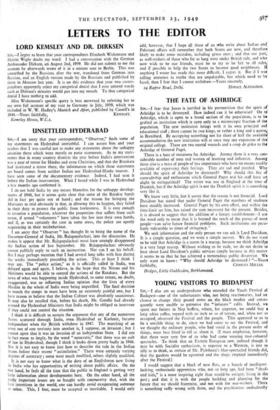UNSETTLED HYDERABAD
SIR,—I am sorry that your correspondent, "Observer," finds some of my statements on Hyderabad untruthful. I can assure him and your readers that I was careful not to make any statements about the unhappy situation there which were merely ex parte statements. As to my state- ments that in many country districts the year before India's intervention was a year of terror for Hindus and even Christians, and that the Razakars had instituted a terror there, the information on which these statements are based comes from neither Indian nor Hyderabad-Hindu sources. I have seen some of the documentary evidence. Indeed, I had seen it before the Indian intervention. What I heard while I was in Hyderabad a few months ago confirmed it.
I do not hold India by any means blameless for the unhappy develop- ments of 1948, but it seems quite clear that some of the Razakar bands did in fact get quite out of hand ; and the reason for bringing the Ministers to trial obviously is that, in allowing this to happen, they failed in their duty to protect the public from lawlessness. It is easy enough to terrorise a population, whatever the proportion that suffers from such terror, if armed " volunteers" have taken the law into their own hands, and if, as was certainly the case in some areas, the police are openly acquiescing in their misbehaviour.
I am sorry that "Observer " has thought fit to bring the name of the Governor-General of India, Mr. Rajagopalachari, into the discussion. He makes it appear that Mr. Rajagopalachari must have strongly disapproved the Indian action of last September. Mr. Rajagopalachari obviously cannot publicly reply to such an insinuation. Nor can I on his behalf. But I may perhaps mention that I had several long talks with him during the weeks immediately preceding the action. This at least I think I may say. The " police action," as it is officially called in India, was delayed again and again, I believe, in the hope that the Nizam and his Ministers would be able to control the actions of the Razakars. But the news of what was happening inside Hyderabad, to some extent, no doubt, exaggerated, was so inflaming Indian opinion that the lives of every Muslim in the whole of India were being imperilled. The final decision to march the troops in must have been an extremely painful one, but I have reason to believe that the Indian Cabinet was absolutely unanimous. It may also be recalled that, before his death, Mr. Gandhi had already warned the Hyderabad Ministers that India might be obliged to intervene if they could not control the situation.
I think it is difficult to sustain the argument that any of the numerous States scattered through India, even Hyderabad or Kashmir, became independent when the British withdrew in 1947. The marching of an army out of one territory into another is, I suppose, an invasion ; but I cannot agree that it was an invasion of an independent State. I did not in fact mean to imply, by the word "autocratic," that there was no rule of law in Hyderabad, though I think it broke down pretty badly in 1948. But it is not easy to know just how to describe the rule in the Indian States before their recent " assimilation." There were certainly varying degrees of autocracy ; some were much modified, others slightly modified.
It is not easy to know what is the duty of an Englishman now living in India who has opportunities of writing about public affairs. On the one hand, he feels all the time that the public in England is getting very little information about developments here. On the other hand, all the really important issues are so fraught with conveyersy that, with the best intentions in the world, one can hardly avoid exasperating someone or other. This, I fear, must be accepted as inevitable. I would only add, however, that I hope all those of us who write about Indian and; Pakistani affairs will remember that both States are new, and therefore likely to make some mistakes, including grave ones ; and that our part,. as well-wishers of those who for so long were under British rule, and who now wish to be our friends, must be to try to be fair to all sides,' and if possible to help the two States to become good neighbours. If anything I wrote has made this more difficult, I regret it. But if I was calling attention to truths that are unpalatable, but which need to be faced, then I fear that I cannot withdraw.—Yours sincerely,


































 Previous page
Previous page